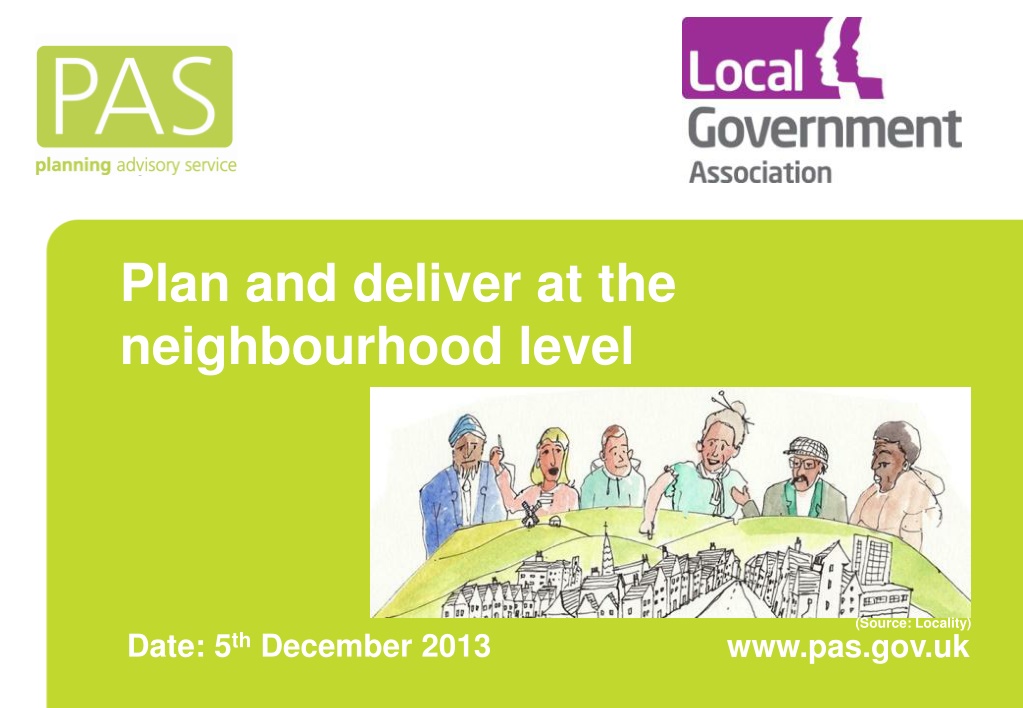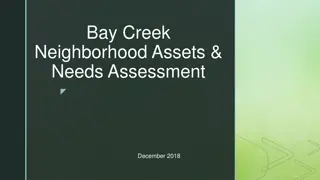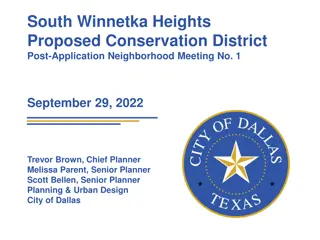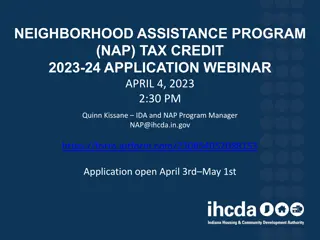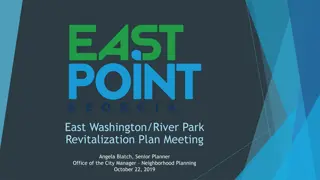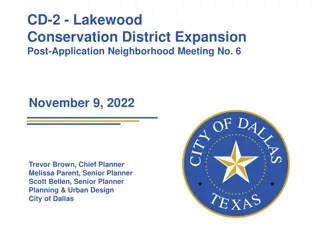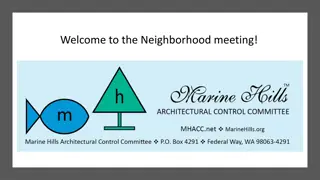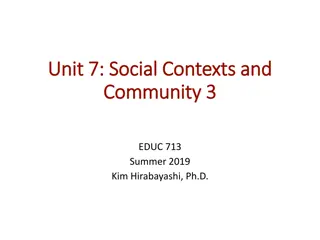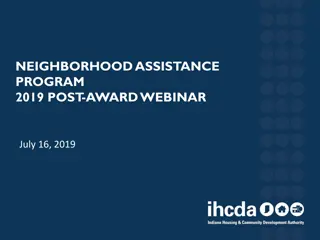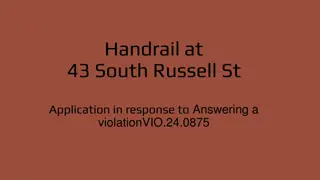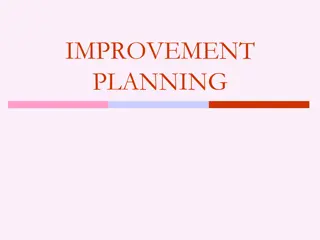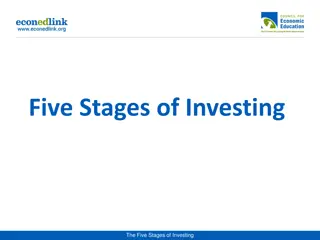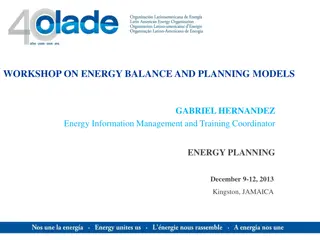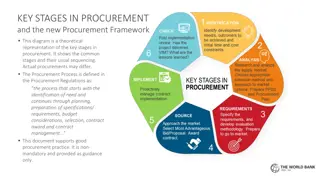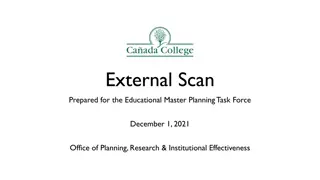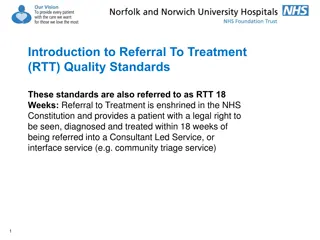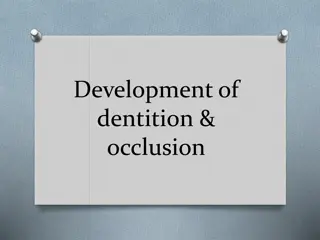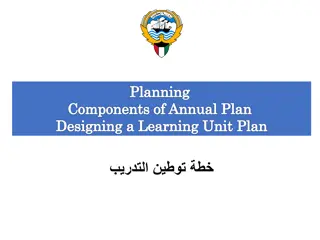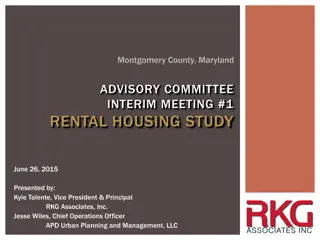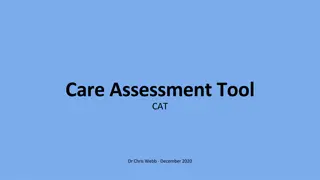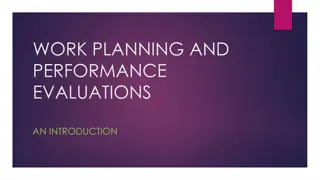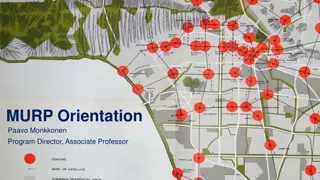Neighborhood Planning: Key Stages and Best Practices
Explore the key stages of neighborhood planning from setting up the plan to engaging the right stakeholders, implementing strategies for sustainable development, and bringing the plan into force. Learn about the role of Planning Advisory Service (PAS) in supporting local authorities, and discover how to navigate challenges, opportunities, and evidence gathering for effective neighborhood development.
- Neighborhood Planning
- Stakeholder Engagement
- Sustainable Development
- Planning Advisory Service
- Local Authorities
Download Presentation

Please find below an Image/Link to download the presentation.
The content on the website is provided AS IS for your information and personal use only. It may not be sold, licensed, or shared on other websites without obtaining consent from the author. Download presentation by click this link. If you encounter any issues during the download, it is possible that the publisher has removed the file from their server.
E N D
Presentation Transcript
Plan and deliver at the neighbourhood level (Source: Locality) Date: 5th December 2013 www.pas.gov.uk
What is Planning Advisory Service for? The Planning Advisory Service (PAS) is part of the Local Government Association. The purpose of PAS is to support local planning authorities to provide effective and efficient planning services, to drive improvement in those services and to respond to and deliver changes in the planning system (Grant offer letter for 2013-14)
Key Facts Started in 2004 Funded by DCLG 11 staff. Supplier framework. Peer community. Always subsidised. Mostly without charge. Non-judgemental. Not inspectors Respond to reform. Keep you current Support, promote, innovate
Your role in helping councils through plan development
Key stages of neighbourhood planning Stage 3 Bringing the plan into force - sustaining Stage 2 Preparing the plan & dialogue - norming, performing Stage 1 Getting established forming, storming Source: Neighbourhood Plans Roadmap Guide. Locality http://locality.org.uk/resources/neighbourhood-planning-roadmap-guide/
Engaging the right people Qualifying Body Working or Reference Group Local Authorities & Service Providers National Builders Local Builders Businesses Self-Builders Co-housing groups Housing Associations / Co-ops More Plan Certainty and Deliverability
Key Stages and Evidence Initial Perception of Needs Challenges and Opportunities Forming and Storming Phase Understanding need and context National & Local Plan Policies, Evidence IE Neighbourhood Household Surveys and Engagement IE Agreement on Needs, Challenges and Opportunities Dialogue Phase Facilitated, Delivery Focused Plan Vision, Aspiration and Priorities IE SA or SEA Social, Economic, & Environmental Evidence Base, Design Briefs Sites and Options IE Draft Policies and options Formal Consultation Recommended Sites, NDOs plus Draft Policies Phase Submission Examination Referendum Adoption Pre-Submission Consultation IE: Interpretation and Gathering of Evidence
Types of Evidence & Challenges Challenges National strategies/plans Independent/Academic Research Other sources (e.g. Natural England/Defra) Strategic assessments Census data Interpreting strategic policies Resourcing detailed NP approaches Understanding evidence National, regional & local statistics Local Studies Community Data Challenges Challenges Site allocation documents Standards / good practices Published research on specific topics Monitoring reports Local profiles Community knowledge Neighbourhood and communities profiles Service providers Consultation events Local groups/networks Local surveys Interpreting academic/scientific language/data Supplying public data (LPA) Engaging (LPA capacity) Identifying updated data / LPAs vs. other sources Manipulating data (data aware/confident) Representing wider community interest
Developing the Vision and Priorities Objective look at local aspiration open mind but older aspirations and assumptions active Campaigns limited number of stakeholders in the loop sometimes rushed Agreement on Needs, Challenges and Opportunities Whose Vision? Does vision excite, draw stakeholders in? Does NP vision fit with Strategic vision and policies? Are priorities the launching stage for themes, working groups and clear objectives? Plan Vision and Priorities
Roles Encouraging quality initial engagement: Broadly targeted Unloaded, clear questions Easily analysed Clear information Systematically written up for later consultation statement Using a variety of media Agreement on Needs, Challenges and Opportunities Getting agreement and focus: feeding in surgery issues & broader policy discussions connecting groups, local business, residents, schools, service providers mediate conflicts between stakeholders on draft policy proposals getting most out of local authority re information requirements encouraging theme groups and help to broaden their appeal and provide encouragement to facilitators managing community expectations of what a neighbourhood plan can and can t do helping to identify resources and settle in those providing technical, policy & process support from outside Plan Vision and Priorities
Community Motivation Influence over development Influence over development gain (CIL) Bringing service planning and spatial planning together Being taken more seriously Anticipating the future (resilience and adaptation) Balance of development Improving place
Big Issues Policy Thinking sustainably Responding to future trends Pacing of development Limited influence over strategic Site assessment criteria How to offer more protection Plan superiority Keeping the balance
Big Issues Practical Agreeing boundary & QB (urban areas) Securing early LPA involvement Resources for new studies Maintaining momentum How to work with developers Putting ideas into policies Taking people along with you Organisation Skills Stakeholders
NDO and CRTBO: Questions and discussion
External examination What are the Basic conditions for Neighbourhood Plans and orders? They must: have appropriate regard to national policy (NPPF) contribute to the achievement of sustainable development be in general conformity with the strategic policies in the local development plan be compatible with EU obligations (e.g. SEA)
External examination What are examiners focusing on? Basic conditions New local evidence Housing numbers Broad engagement and consultation Decision-making considerations - options
Referendum The examiner can recommend that the referendum go beyond the neighbourhood area if its impacts will be felt more widely. If supported by over 50 per cent of voters, the plan or order is then made (brought into force) by the local authority. Local authorities should do this promptly following the referendum result. There are regulations and codes of practice that prohibit attempts to unduly influence neighbourhood planning referendums
Referenda Regulations An Information Statement and Specified Documents must be published not fewer than 28 days (56 days for business referendum) before the referendum will be held. Specified documents include: the draft plan/order, the examiner s report, summary of representations, statement on basic conditions and general info Restrictions imposed on the material that may be published by/on behalf of the council and LPA for the area 28 days before the referendum is held e.g. materials re: issues raised, arguments for or against etc. A referendum campaign may be conductedby a campaign organiser to promote/procure an outcome in relation to the referendum question. Expenses incurred for a campaign are limited to 2,362 plus 0.059 per elector on the relevant register (or rate payers for business referendums). It is an offence to exceed these limits. Matters relevant to referendum expenses are listed (Schedule 2 and regulation 7).
Code of recommended practice on local authority publicity DCLG introduced a new publicity code for local councils in England (2011). The code provides guidance on the content, style, distribution and cost of local authority publicity and includes guidance on referendums. DCLG are proposing to give this guidance greater force by putting compliance with the code on a statutory basis.
What the code says Particular care must be taken during the period before referendums to comply with legal restrictions Where assistance is provided to third parties you should ensure recipients adhere to principles in the code It is acceptable to publish material on subject matter of a referendum (e.g. correct factual inaccuracies in publicity produced by third parties) provided this is even-handed and objective and does not support or oppose options subject to the vote
Further support, briefings and training Locality Roadmap - http://locality.org.uk/resources/neighbourhood- planning-roadmap-guide/ Planning Camps - http://locality.org.uk/projects/building- community/planning-camp/ Planning Camps are free events designed to give inspiration and guidance to groups wanting to create a neighbourhood plan.
Further support, briefings and training Other resources: Community Knowledge Hub http://planning.communityknowledgehub.org.uk/ Community Planning http://www.communityplanning.net/index.php Our Neighbourhood Planning http://www.ourneighbourhoodplanning.org.uk/home
This is nice, but not useful We need to know what you think Comments triply welcome We read all of them We use your ideas to change what we do and how we do it
Follow-up evaluation We employ a company called Arup to follow- up on our work On reflection, was today actually useful ? 10 mins of feedback in return for 100 s of support Our board use this to decide what we do with our grant. If we don t get positive feedback we are unlikely to continue There is list of naughty councils with low response rates.
Come and see us Sign up for newsletter. @pas_team Knowledge Hub
** Leave your badges ** email pas@local.gov.uk web www.pas.gov.uk phone 020 7664 3000
